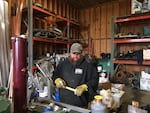
Commercial fisherman Clint Funderburg works a side job building refrigeration for one of many fishing boats that are stuck at the dock during the coronavirus pandemic.
Cassandra Profita/OPB
Commercial fisherman Clint Funderburg should be on the ocean right now, catching Dungeness crab on his fishing boat, the Widgeon. Instead, he’s in his shop in Newport, and his boat is parked at the dock — likely until June.
When crab prices tanked a few weeks ago, he shifted gears to his off-season side gig. So, he's building a refrigeration system for one of the many fishing boats that are stuck at the dock right now.
The coronavirus pandemic dealt its first blow to the West Coast fishing fleet back in January, cutting off lucrative live crab sales to China for the Chinese New Year.
From there, things only got worse as the virus spread across the globe and restaurants everywhere closed their dining rooms. This time of year, Funderburg would normally be getting $7 or $8 a pound for Dungeness crab. When it got down to just $2 a pound last month, he gave up.
“The company was starting to lose money," he said. "We just quit fishing, called it a season. There are very few people left fishing. You know, you basically can't hardly get rid of the crab. Normally, we would crab through May, and a lot of the guys do. Especially the smaller boats count on March, April, May to really make their seasons.”
The pandemic has him thinking differently about what’s worth fishing for right now. He’s decided to keep his boat at the dock until June when he can catch albacore tuna - which is more likely to be canned and sold in grocery stores.
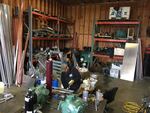
Clint Funderburg builds a refrigeration system in his shop while he waits for better fishing markets.
Cassandra Profita/OPB
Mandatory restaurant closures during the coronavirus pandemic have sent shock waves through Oregon's $700 million seafood industry. The overwhelming majority of the seafood that lands on Oregon's docks gets eaten in restaurants, and no one knows when that market will return. In the meantime, fishermen are parking their boats as seafood prices plummet. Seafood processors are filling up their freezers and selling most of their products to grocery stores while trying to minimize layoffs at their processing plants.
Funderburg said some seafood options are more heavily dependent on restaurants than others, and that's a key factor in his decisions about fishing right now.
“Crab is one of those things that, you know, the majority of it’s eaten in a restaurant in a fancy dinner when people come to the coast,” he said.
Normally, he’d go shrimp fishing when he was done crabbing, but he decided against it this year.
“Because once again, that's primarily a restaurant product," Funderburg said. "You know, the restaurants are shut down and nobody's even sure what shape the restaurants are gonna be in when they open back up. How many restaurants are going to survive this, and how many people are gonna eat expensive seafood dinners out on the town when things change?"
Seafood restaurants close and retool
The same kinds of questions are looming over Local Ocean Seafoods, a restaurant and fish market on Newport’s bayfront.

Local Ocean Seafoods owner Laura Anderson greets customers at her empty restaurant, which is now offering seafood meal kits for pick-up and delivery.
Cassandra Profita/OPB
Owner Laura Anderson is standing inside her restaurant and greeting customers on the sidewalk from behind a face mask. Behind her, employees are snapping open to-go bags and racing to fill them with food.
"Hiya! Hi Theresa!" she calls out, pulling out a clipboard with a spreadsheet of customer names. “Is it under Bill’s name?”
Ever since Gov. Kate Brown ordered the closure of dine-in restaurants, Anderson has been scrambling to set up a new way to sell the seafood her business depends on. She scans the sheet of customer orders for the new meal kit they're calling a "Dock Box."
“William, maybe? We have this sorted by first name, which is ridiculous,” Anderson says.
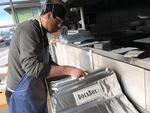
Local Ocean Seafoods has kept some of its employees working with a new "Dock Box" meal kit service that they're offering for pickup and delivery.
Cassandra Profita/OPB
They're offering the meal kit for pickup or delivery, drawing on their existing customer base to keep some semblance of a business going while the Local Ocean Seafoods restaurant and fish market are closed. They spent the morning cutting tuna, making crab cakes and packing the makings of a seafood dinner into ziplock bags and cups with lids that they warned customers weren't performing as well as they'd hoped.
“It seemed so simple, just put together a little meal kit. How hard could it be?” Anderson said. "But normally, I don't know, you'd take a long time, maybe a month or two, to set something like this up. So it's been intense.”
Anderson said she basically started up a whole new business in a matter of days, choosing a product and figuring out how to package and market it after she closed the popular business she had been running.
"I called the staff in and I had to lay off all of our dining room service staff," she said. "That was a hard day."
Now, Anderson is carefully measuring exactly how much seafood she should buy from fishing boats so that nothing goes to waste. And she's thinking about ways to expand her offerings to keep some employees working and cover expenses like rent and healthcare.
"I always remind my staff and tell them when I'm training them that we're not just another fish and chips joint. To me that was really clear in the face of this crisis," Anderson said. "Our whole premise for Local Ocean is that we have access to this fresh, wild Oregon seafood and that people want it. We have a unique access to that because of the relationships we have with fishermen at the docks. And that hasn't changed, that's still there. Even though our dining room closed, we still have the relationships."
Direct marketing offers hope
Most of Oregon’s seafood market has shifted to grocery stores for now.
But fishermen and seafood processors say without knowing when restaurants will reopen, they’re hoping to do their own version of what Local Ocean is doing now: marketing seafood directly to people who can cook it up and eat it at home.

Local Ocean Seafoods owner Laura Anderson, right, hands a seafood meal kit to a customer who signed up for the company's new "Dock Box" offering.
Cassandra Profita/OPB
Glen Spain, Northwest regional director for the Pacific Coast Federation of Fishermen's Associations, said selling seafood directly off the boat could be a good option for fishermen right now but it's a lot for a small fishing business to take on.
"Markets are disappearing," he said. "Between 60 and 80% of our markets were restaurant-based, particularly for smaller local boats that delivered to the local community. That's a big problem. So, people are doing everything they can to develop new markets."
Congress recently appropriated $300 million in disaster assistance for the seafood industry in its $2 trillion COVID-19 relief package last month, but Spain and others have said the industry is going to need a lot more to sustain seafood markets during and after the pandemic.
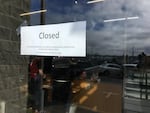
With the coronavirus pandemic forcing restaurants across the country to close, seafood markets that depend on those restaurants have collapsed.
Cassandra Profita/OPB
"Spreading that out over an entire fishery with tens of thousands of people all of whom are losing money is not going to be enough," he said. "It's gonna be barely enough to keep us alive but it won't support our infrastructure."
After restaurants were forced to close, Pacific Seafood, the largest seafood processor on the West Coast, turned its business upside down to prioritize grocery store markets.
Tony Dal Ponte, director of government affairs for Pacific Seafood and a member of the company's COVID-19 response team, said his company had to make some layoffs and reconsider what kind of fish it should buy from the fishing fleet.
"When you close the restaurants or significantly limit restaurant demand, we have to change what we're processing, what we're distributing and who we're talking to," he said. "We've been partnering with our retailers on ready-to-eat and ready-to-cook products that are easier for families that are sheltered at home to cook and make for themselves."
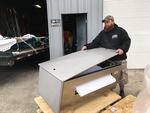
Clint Funderburg unloads a piece of refrigeration equipment for a fishing boat he's working on while he's waiting out uncertain seafood markets.
Cassandra Profita/OPB
Last week, the company launched its own online seafood market to deliver seafood directly to consumers and has seen people ordering seafood not just for themselves but also as gifts for friends and family.
Fishermen are used to dealing with uncertainty, according to Nancy Fitzpatrick with the Oregon Salmon Commission. But with this year's salmon season coming up, she said, it's unclear what market there will be for any salmon that comes in and if there isn't whether the salmon can be frozen or canned and sold later.
"There are a lot more unknowns than a typical season, unfortunately," Fitzpatrick said. "Every year you have to wonder: Do we get a season? Is the price there? Now we add no markets. You won’t know until the first boat comes across the dock."
